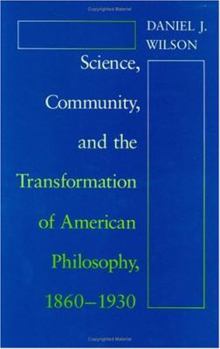Science, Community, and the Transformation of American Philosophy, 1860-1930
In the first book-length study of American philosophy at the turn of the century, Daniel J. Wilson traces the formation of philosophy as an academic discipline. Wilson shows how the rise of the natural and physical sciences at the end of the nineteenth century precipitated a "crisis of confidence" among philosophers as to the role of their discipline. Deftly tracing the ways in which philosophers sought to incorporate scientific values and methods into their outlook and to redefine philosophy itself, Wilson moves between close analysis of philosophical texts and consideration of professional careers of illustrative philosophers, such as Charles Sanders Peirce, John Dewey, and Josiah Royce. The author situates the emergence of professional philosophy in the context of the professionalization of American higher education and articulates, in the case of philosophy, the structures and values of a professional discipline. One of the most important consequences of this transformation was a new emphasis on communal theories of truth. Peirce, Dewey, and Royce all developed sophisticated and important theories of community as they were engaged in reshaping and redefining the limits of philosophy. This book will be of great importance for those interested in the history of philosophy, the rise of professions, and American intellectual and educational history, and to all those seeking to understand the contemporary revival of pragmatic thought and theories of community.
Format:Hardcover
Language:English
ISBN:0226901432
ISBN13:9780226901435
Release Date:March 1990
Publisher:University of Chicago Press
Length:238 Pages
Weight:1.15 lbs.
Dimensions:0.8" x 6.3" x 9.3"
Related Subjects
PhilosophyCustomer Reviews
1 rating
Readable and Detailed Narrative
Published by Luke Jones , 5 years ago
Highly readable yet well detailed narrative following several major American philosopher careers during a time of huge transition in academia and philosophy. Must have edition for any serious student of American thought.





